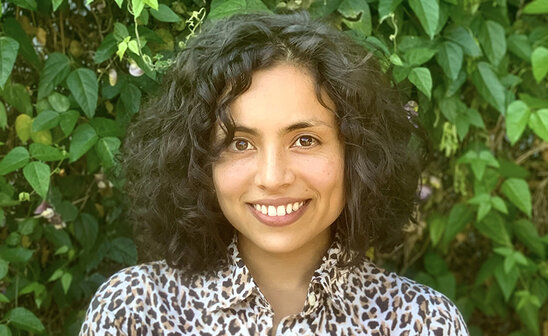Exploring the embodied and interactive use of language in lived spaces

Kamala Russell’s fieldwork looks beyond traditional methods of tracking interpersonal interactions.
By Sarah Steimer
“What does it mean to be sitting in a room with someone and they're talking to you, you're near them — there's so much more that occurs in a conversation,” says Kamala Russell, of her research and teaching interests.
An assistant professor in the Department of Anthropology, Russell explores the intersections of communicative and ethical practice with grammar and space. In particular, she focuses on how profound social and infrastructural shifts can affect interpersonal communication.
Russell, who received her PhD from UC Berkeley 2021, began her academic career in linguistics, but shifted to anthropology to focus on interactions and the use of language in social life.
Her interest in context between related languages led her to fieldwork within a multilingual situation, where people were speaking Arabic — a language she’d studied — in various dialects, along with other languages.
Initially focused on language shifts and changes, she began to take note of the other interactions and experiences between individuals: the embodied and interactive use of language in lived spaces, as she describes it, which she explores by way of anthropology, linguistics, social and political theory, Islamic studies, gesture studies, and semiotics.
“In events when you're using language, it isn't just telling us about ways grammars can change,” Russell says. “It’s also telling us about dynamics in the way people imagine what others are, and what it means, existentially, to live in the world.”
Her dissertation, fieldwork, and continuing research interests have focused on a minority language that's spoken in the southern part of Oman, in the Arabian Peninsula. This work centers on a region just outside the town of Salalah in the Dhofar Province of the Sultanate of Oman with speakers of the Śhehrēt Modern South Arabian language. Her project with such speakers considers communicative practices: the different kinds of interactions and settings in which people use this language in patterned ways.
Oman in general and Dhofar in particular is an area of the world where a huge amount of infrastructural and social development has occurred in the last 50 years. According to Russell, this means that Śhehrēt speakers of a certain age grew up in a vastly different kind of world than the one existing there today. She says her work is a general ethnography of how the language is spoken in everyday life — a broad focus she decided on to examine the way language use fits into this changing ecology of media, mobility, and social relations.
Her big question — the focus of her current book project — is how this change affected the ways that people practice using language in everyday life: how it affected the use of language in the ways that people sense anxieties, protect and conceal themselves, arrange themselves in relation to others, or even the rhythms of who comes into a person’s home and who doesn't.
In addition to her research projects, Russell is preparing for a future course she’s teaching at UChicago that considers different methods for theorizing interpersonal interactions, beyond noting pauses, body language, and other traditional methods. It’s a core part of her interest in exploring language in a lived space.
“In one society in a particular historical moment, what actually is it to be close to another person?” She says. “We can think about conversation as a real thing that's happening to your body in space, where the entire body is speaking. It raises questions that aren't just about what you say. It’s considering the linguistic theories about interaction, but also trying to think about interaction as an event that takes place in space that involves bodies, that has a different kind of actuality.”
 THE UNIVERSITY OF CHICAGO
THE UNIVERSITY OF CHICAGO

